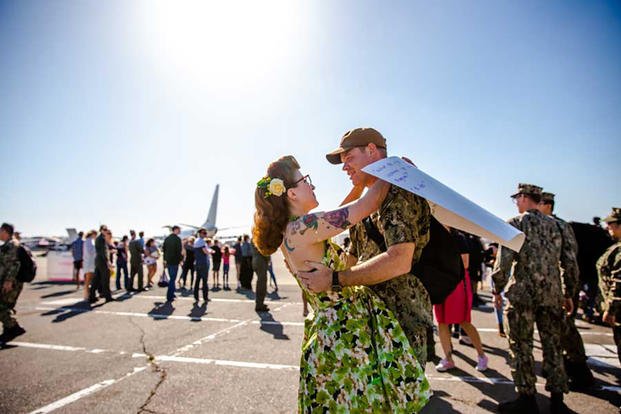The whirring sound of rotor blades became louder and louder as the helicopters loomed into view, punctuating the skyline over Cabrillo National Monument, directly across the bay from Coronado Island. My heart beat faster and faster as I noticed my green satin dress and tan shrug. They were looser fitting now than when I bought them a couple of months before in anticipation of this day.
The engines stopped, and everyone grew quiet as the crew began to disembark. It was March 2005, and my husband had been gone for six months on his second deployment.
I spotted him right away. We locked eyes. I ran to him as quickly as I could wobble in my platform sandals, and he scooped me up to hug me tight. The look of joy that had been on his face when he first saw me, though, faded quickly to concern, and that perfect moment was over.
“You’re so thin. What happened?” he whispered.

I brushed off the question, but the circumstances that led him to even comment on my appearance made me wonder, “How did we get here?”
Before he left, I reached out for advice from other Navy spouses who had been where I was, in a brand-new city thousands of miles from home, facing a long separation, with very little support. The main thing, it was instilled into me over and over, was to be strong. Being strong was important, because our spouses had to be confident that we could handle things while they were gone. We were never to worry them, never to tell them anything bad, never even to say that we missed them, because it would be upsetting, and there would be nothing they could do about it. They had to know that we were all right. We had to just figure everything out, because, as I was also told, asking for professional help would ruin my husband’s career, which would be my fault for not handling my circumstances on my own like I was supposed to.
I tried hard to be that archetypal strong spouse. I didn’t cry the night I dropped him off, at the docked USS Abraham Lincoln in San Diego, because I was told that we should keep any sadness to ourselves. I bravely smiled into the phone when he called, while brushing tears off of my face that first holiday season 3,000 miles from my family. I told my husband everything was fine and that I was doing “so great” in every email I sent. Meanwhile, I was severely depressed and anxious. I was determined to “be strong,” because that meant being worthy, and I badly wanted to be worthy, to belong to this group of military spouses who held it together.
The reality, of course, was different. I was struggling, badly and turned again to an eating disorder that had been the devil on my shoulder since high school, something that gave my life some semblance of order when everything was chaotic. At the time, bulimia was the one thing over which I had total control. As a military spouse, being told to bottle everything up so I would not distract my husband from another ubiquitous mission made me fade into the background as mental illness consumed me. All the while, he was thousands of miles away, doing humanitarian work in Sumatra after a devastating tsunami, under the impression that nothing was wrong at home.
The look of shock on his face after that first hug is permanently seared into my memory. We came to an agreement after that deployment that we would never keep secrets from each other, that even if we couldn’t be physically together, that we would support each other no matter what. After all, we had promised for better, for worse, in sickness and in health.
I know now that I was given incorrect advice to “be strong,” and that seeking help would not ruin my husband’s career. In fact, sometimes being strong is having the courage to ask for help and admit when you are struggling. I know now that keeping secrets from your spouse about serious problems, even if your intention is to be protective, can make reuniting and reintegration after a long separation that much more difficult. Unfortunately, I still hear that well-intentioned but misguided advice floating around today, the same words I heard nearly 17 years ago.
It’s time to update that advice and change the narrative. You can be strong and also leave to be in a familiar place or stay with family during a long separation, instead of trying to manage life alone. You can be strong and realize that you’re drowning, and reach out to mental health professionals to throw you a life raft. You can be strong and utilize resources like Military OneSource, Military Spouse Advocacy Network or branch-specific community services. They all share the same mission of helping military families navigate life and even thrive. You can be strong and still share with your spouse when you’re having a hard time. You can be strong and ask for help from friends or family, and admit that you really aren’t sure what to do. It takes an enormous amount of fortitude to realize that you can’t do it all by yourself. You do not have to be that stereotypical definition of “strong” all the time.
You just have to be you, and if that means asking for help, there is absolutely no shame in that. You don’t have to be a superhero. I wish that just one person had told me that 17 years ago. Those words might have been the life raft I needed when I was drowning and pretending everything was just fine when things had never been harder. My well-being, my health, my very sense of self mattered then. It has mattered all along. And I want other spouses to know that theirs does, too.
This article first appeared on The War Horse, an award-winning nonprofit news organization educating the public on military service, war and its impact.
Jenna Levin lives in San Diego with her husband of nearly 17 years. Like her hero, the late actress and author Carrie Fisher, she is a firm believer in staying afraid, but trying new things anyway, using humor to deflect from awkward situations, and destigmatizing mental illness. When she’s not working, writing or caring for cats she’s got to put through college (and they don’t want to go to a state school), you can find her knitting, reading, baking or hiking.
Keep Up with the Ins and Outs of Military Life
For the latest military news and tips on military family benefits and more, subscribe to Military.com and have the information you need delivered directly to your inbox.









